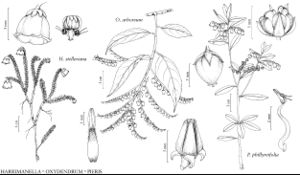Harrimanella
Proc. Wash. Acad. Sci. 3: 570, figs. 62, 66. 1901 ,.
Subshrubs small; branches prostrate, spreading, or ascending, mat-forming. Leaves densely crowded on stems; petiole very short, leaving small pegs on stem when leaves fall off; blade linear-oblong to subulate, margins entire or erose, surfaces glabrous. Pedicels nodding in flower, erect in fruit, slender; bracteoles absent. Flowers: sepals distinct or connate basally, ovate to oblong-ovate; petals connate ca. 1/2 their lengths, white or tinged with pink, apex blunt; stamens not exserted; filaments swollen at base; anthers inverted at anthesis, with awns; ovary globose to ovoid; style ovoid or conic; stigma simple. Capsules borne on erect pedicels, globose to ovoid, dehiscent basipetally. x = 16.
Distribution
North America, n Europe, n Asia.
Discussion
Species 2 (2 in the flora).
Selected References
Lower Taxa
Key
| 1 | Leaves divergent, blade linear-oblong, apex obtuse to broadly acute; pedicels barely exceeding leaves at anthesis; capsules 4-5 mm diam. | Harrimanella stelleriana |
| 1 | Leaves loosely appressed, blade linear to subulate, apex acute; pedicels 3+ times longer than leaves at anthesis; capsules 2-3.5 mm diam. | Harrimanella hypnoides |
